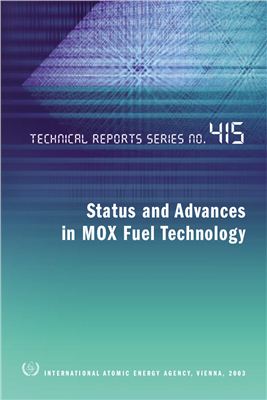IAEA, Vienna, 2003, -190 p. ( Анг. язык)
1. Plutonium.
2. Nuclear fuels.
3. Spent reactor fuels.
4. Nuclear reactors.
5. Fast reactors.
6. Radioactive wastes.
7. Nuclear reactors — Decommissioning.
8. Hazardous wastes — Transportation. I. Inteational
Atomic Energy Agency. II. Series: Technical reports series (IAEA).
In May 1999, the IAEA, in cooperation with the OECD NEA, organized a Symposium on ‘MOX Fuel Cycle Technologies for Medium and Long Term Deployment’ in which more than 150 participants from 28 countries and four inteational organizations took part. In addition to dealing with current technologies for the MOX fuel cycle, the Symposium considered the future place of plutonium recycle. In this respect, it provided a comprehensive picture of the situation as of the end of December 1998. The Symposium was commended by the IAEA Board of Goveors at their meeting in June 1999. It was proposed that a review be made of the status and development trends of advanced MOX fuel technologies based on the Symposium papers and on updates to account for developments since then. In addition, the long term initiatives which need to be put in place to ensure acceptance by the public of plutonium recycle, to offer a very long term environmentally friendly and sustainable energy supply, and at the same time ensure high security against proliferation, were to be examined. This report represents an overview of the worldwide state of plutonium fuel development as of December 2000 with an outline of future trends. The review was prepared by a group of experts in the field, under the chairmanship of H. Bairiot, and supported by information from specialists in plutonium fuel developments and related subjects that the IAEA engaged. Information on the present status of, and development trends in, MOX fuel technology in the areas of design, fabrication, performance, in-core fuel management, transportation, spent MOX fuel management, decommissioning, waste treatment, safeguards and alteative approaches for plutonium recycling is provided. The report concentrates on MOX fuel for thermal power reactors; however, specific aspects of fast reactor MOX fuel are also considered.
1. Plutonium.
2. Nuclear fuels.
3. Spent reactor fuels.
4. Nuclear reactors.
5. Fast reactors.
6. Radioactive wastes.
7. Nuclear reactors — Decommissioning.
8. Hazardous wastes — Transportation. I. Inteational
Atomic Energy Agency. II. Series: Technical reports series (IAEA).
In May 1999, the IAEA, in cooperation with the OECD NEA, organized a Symposium on ‘MOX Fuel Cycle Technologies for Medium and Long Term Deployment’ in which more than 150 participants from 28 countries and four inteational organizations took part. In addition to dealing with current technologies for the MOX fuel cycle, the Symposium considered the future place of plutonium recycle. In this respect, it provided a comprehensive picture of the situation as of the end of December 1998. The Symposium was commended by the IAEA Board of Goveors at their meeting in June 1999. It was proposed that a review be made of the status and development trends of advanced MOX fuel technologies based on the Symposium papers and on updates to account for developments since then. In addition, the long term initiatives which need to be put in place to ensure acceptance by the public of plutonium recycle, to offer a very long term environmentally friendly and sustainable energy supply, and at the same time ensure high security against proliferation, were to be examined. This report represents an overview of the worldwide state of plutonium fuel development as of December 2000 with an outline of future trends. The review was prepared by a group of experts in the field, under the chairmanship of H. Bairiot, and supported by information from specialists in plutonium fuel developments and related subjects that the IAEA engaged. Information on the present status of, and development trends in, MOX fuel technology in the areas of design, fabrication, performance, in-core fuel management, transportation, spent MOX fuel management, decommissioning, waste treatment, safeguards and alteative approaches for plutonium recycling is provided. The report concentrates on MOX fuel for thermal power reactors; however, specific aspects of fast reactor MOX fuel are also considered.

